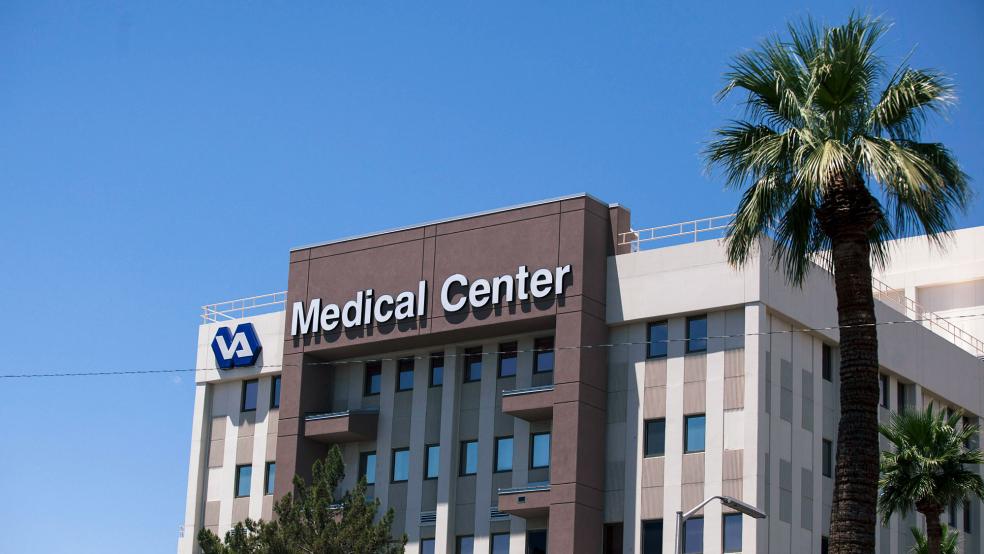In the latest chapter of the Department of Veterans Affairs sorry saga of reforming its health care services to millions of military veterans, officials this week unveiled an ambitious – and highly costly—new plan.
This one would merge and streamline the department’s fractured network of private doctors and clinics that supplement the care provided by the VA’s hundreds of health care centers across the country.
Related: Latest Outrage at the VA: Execs Profiting on Moving Expenses
Still reeling from a 2014 scandal in which 40 military veterans died while waiting for appointments at VA health centers in Phoenix, VA officials can point to successes there and elsewhere in slashing long waiting lists for veterans by 84 percent or more.
“While this is encouraging progress, the Department’s goal is to provide all veterans with timely, high-quality, clinically appropriate care,” Sloan Gibson, deputy secretary of Veterans Affairs, testified recently. “Veterans are our customers – we will use all authorities we have to continue to get Veterans off wait lists and into clinics.”
But legislation authorized by Congress in 2014 to allow veterans to seek private care in cases where they live too far from a VA health center has been a big disappointment. As of late February, just 27,000 veterans had made appointments for private medical care since the VA began mailing “Choice Cards” last November, according to a VA report to Congress.
Costs Spiral Out of Control
Beyond concerns about the efficacy of the new approach is the troubling matter of cost. Until now, Congress has been willing to throw massive amounts of money at the serious management problems at the VA to staunch a public outcry, but at some point, VA spending will pose a huge challenge to the White House and Congress.
The VA has an annual operating budget of about $70 billion, along with $95 billion of spending on mandatory or entitlement programs. Last year, Congress rushed to approve a major overhaul and reform of the VA health care system and administration at a cost of an additional $16 billion over several years.
But that was just the beginning. The new push to privatize health insurance for many veterans could cost as much as $13.6 billion more in the coming three years, to provide the new private services and revamp an outmoded computer system to handle billings and claims, according to rough estimates the VA provided to Congress.
And the VA is struggling with other budgetary problems as well. Last June, the VA revealed that the soaring cost of new wonder drugs for veterans suffering from the potentially deadly Hepatitis C virus had blown a hole in its budget. The agency had to scramble to shift $697 million to cover the $1.1 billion cost of the new drugs, including Sovaldi and Harvoni.
Even if the VA could create a create and consolidate a private health care system, surveys and reports indicate that many veterans – especially older vets from the Vietnam War era– are highly suspicious of efforts to privatize the VA’s health care programs and prefer to take their chances with VA medical centers. Many simply don’t believe that private insurance or medical care is adequate to accommodate the special needs of veterans. And they are wary of voucher programs or even Medicare to purchase outside care.
Related: The VA’s Bureaucratic Nightmare: Thousands of Vets Died Waiting for a Response
A survey released last week by the Vet Voice Foundation showed that nearly two-thirds of veterans oppose “privatizing VA hospitals and services,” according to the Huffington Post. What’s more, 80 percent of the vets interviewed believe that veterans “deserve their health care to be fully paid for,” not vouchers which may not cover all the costs.
So lawmakers, veterans groups and others must look with some skepticism and trepidation at the VA’s new proposal to take the choice program to a new, higher level to address a mounting demand for quality health care.
As The Washington Post noted this week, the VA for many years has referred veterans to private doctors to fill in gaps in health care coverage, especially in rural areas where doctors or hospitals are often many miles away. Currently, about 10 percent of VA medical appointments are with private physicians or health care professionals.
With a surge in returning veterans from Afghanistan and Iraq combined with Vietnam War vets, VA officials realize they have to offer more care than is possible solely relying on the VA’s 152 medical centers and 1,400 community-based outpatient clinics and community living centers.
Related: VA Gets to Work, Reduces Backlog of Disability Claims by 84 Percent
Many conservatives, including GOP presidential candidate Ben Carson, favor a move to more private coverage to increase efficiency and ultimately bring down costs, while many Democrats and veteran groups are wary of a wholesale shift to private care.
But so far, at least, VA Secretary Robert A. McDonald and his top lieutenants haven’t been able to demonstrate they can build a parallel universe of private health coverage that would attract large numbers of veterans and engender confidence in the new system.
The New Veterans Choice Program outlined by the VA before the House Veterans’ Affairs Committee on Wednesday would consolidate the agency’s seven existing private health care programs into a single, ideally seamless system that would steer hundreds of thousands of veterans into private care.
“The New VCP will clarify eligibility requirements, build on existing infrastructure to develop a high-performing network, streamline clinical and administrative processes, and implement a continuum of care coordination services,” Gibson told committee Republicans and Democrats.
Related: Americans Sour on VA After Health Care Scandal
Congress must approve the new Veterans Choice Program, although there is little doubt that lawmakers in the end will have to go along with it, while crossing their fingers that it will work. While this may be the agency’s last best chance to salvage its star-crossed health care services, until now there has been little to suggest it will work.





